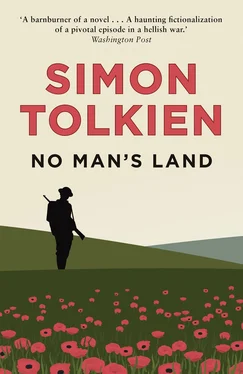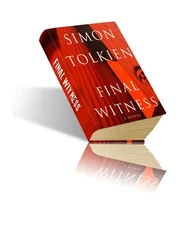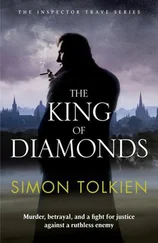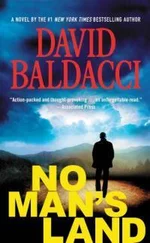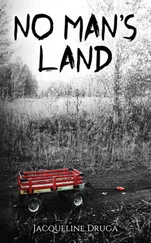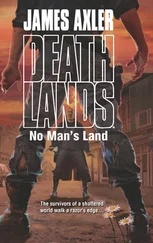1 ...7 8 9 11 12 13 ...35 ‘No, the firm I was apprenticed to specialized in putting up structures round pitheads to house the heavy machinery and to support it too. It meant I was working side by side with miners all the time so I got to know their ways.’
‘And is that what you’re going to be doing now?’ asked Adam. ‘Building things for them?’
‘No, this is different – nothing to do with construction. I’m working with them – or rather for them, I suppose. I’m to be their checkweighman, which means I measure the weight of the coal in each tub they’ve mined to make sure they get paid the right amount for it.’
‘So you’re down in the mine as well, with them?’ asked Adam nervously. The thought alarmed him – it made him think of being buried, like his mother. He was brave by nature but the thought of being underground had always terrified him. He remembered the well at the back of the school in Islington that Old Beaky had told them was out of bounds. Adam had disobeyed at the first opportunity, using all his childish strength to push the thick wooden cover aside. And, if he shut his eyes, he could still relive the long wait after he threw in a stone, counting the seconds before he heard the faint splash deep down below. He’d had nightmares for weeks afterwards, dreaming of falling down into the thick darkness, his unheard cries echoing off the damp brick walls.
‘No, don’t worry. I’m up on the surface where the tubs of coal come out,’ said Daniel reassuringly. He knew all about his son’s phobia – he’d never even been able to persuade Adam to set foot in the London Underground, let alone get on one of the trains. ‘The job’s not dangerous,’ he went on, ‘but it’s important, and the money will be better than what we’re used to, which will help.’
Daniel’s words were optimistic but Adam sensed an uncertainty lurking underneath and wondered if his father was feeling ashamed that he wouldn’t be sharing the hardships of the men that he was working for. But Adam dismissed the thought: what mattered was that his father would be out of harm’s way. He’d lost his mother and he didn’t want to risk losing his father too.
‘How did you get the job?’ Adam asked. It made no sense that his father should have been able to walk into this cushy, well-paid job in this faraway place when by his own admission he’d never actually been a miner.
‘I have a cousin who recommended me. He’s a good man and he’s worked in the Scarsdale pit most of his life so he has a lot of influence with the men. And it turned out they wanted me because of what I’d done down here with the builders’ union – getting more members, getting organized. It’s the miners’ union that’ll be paying me,’ said Daniel.
‘Will you make them strike?’ asked Adam anxiously. He knew what union work meant – poverty and violence and death. Was this what lay in store for them in the north? A second dose of what they were trying to leave behind?
‘No, I hope it won’t come to that,’ said Daniel, choosing his words carefully. ‘I do want to help, to make things better. But I hope I can achieve that by negotiating with the owner. I hope he’ll listen to reason. I learnt from what happened with your mother, Adam. It changed me, you know, just like it’s changed you.’
Later, much later, they had to change trains. Crossing a footbridge in the rain, they looked across a moonlit landscape of warehouses and factories to where the funnels and chimneys of a blast furnace were throwing columns of white fire and belching orange smoke up into the night sky.
Adam stopped, awestruck. He had never seen anything like it.
‘The jaws of hell,’ said Daniel, clapping his son on the shoulder. ‘And inside it’s hotter than hell; hot enough to make iron into steel, which is what the British Empire is built on. And the fires never stop. They can’t because the demand never does. And the fires need coal, mountains of coal. Which is where we come in,’ he added with a smile.
They got to Scarsdale on the dawn train. And at first, as they approached, Adam could see nothing of the mine. Instead the view from the window was a vision of loveliness. Still-water lakes and green fields carpeted with the first wild flowers of spring, divided one from another by silvery white dry-stone walls; woods of beech and oak and quick-flowing streams, and up on the crest of a hill a picturesque village of thatched cottages surrounding the weathered tower of a mediaeval church. But the railway didn’t go that way, curving round instead into the valley behind where all at once the landscape was utterly transformed. Down below in the valley bottom the mine was marked out by a line of wooden towers and tall red-brick chimneys standing across from a huge man-made heap of slate-grey waste, and stretching up from it on all sides row upon row of squat grey houses, monotonous and monochrome, straddled the hillsides like an encamped army of insects. The change in the view shocked Adam. It was jarring – almost violent – to go from beauty to ugliness in a moment; from a world unchanged in centuries to this industrial outcrop of the new century, with both existing side by side in a bizarre juxtaposition.
As they got closer, Adam could see that the houses were built almost back to back along long narrow streets which all led down like the irregular hands of a giant clock towards the mine at the centre, surmounted by the high towers that dominated the landscape. They had huge wheels at their apex and Adam could see that one set was turning as they approached. The spokes of each one rotated in opposite directions and the sense of power they conveyed reminded Adam of the beast-like locomotive at the front of the train that had made such an impression on him at the station in London.
‘What are they? What do they do?’ Adam asked his father, pointing towards the towers.
‘They’re the headstocks – winding gear like I used to work on. The wheels draw the steel cables that raise and lower the cages up and down the mine shafts,’ said Daniel admiringly, looking at the structures with a craftsman’s eye, taking pleasure in their design.
‘How deep are they?’ asked Adam.
‘Different depths: I’ve heard the deepest is over five hundred feet,’ said Daniel.
Adam shivered. Again he remembered the well in the school yard, the coin falling and the splash far away down below. He’d been terrified but fascinated too, going back again and again for weeks afterwards, drawn to the well like a magnet, although he’d never removed the cover after that first time.
‘Don’t think about the shafts,’ said Daniel, sensing his son’s anxiety. ‘I told you I’m going to be working at the pithead, not down below.’
‘What about me?’ asked Adam.
‘You?’ said Daniel, sounding shocked. ‘I’d never let you work in a mine. You’re my flesh and blood, all I’ve got left, and I’m going to look after you, keep you safe. You believe me, don’t you?’ he asked, looking hard at his son.
Adam nodded, grateful for the reassurance, although he wondered at his father’s willingness to come to this place and represent the men when he was obviously so appalled at the idea of sending his own son underground to work with them.
‘You’re going to school,’ Daniel went on. ‘It’s all arranged. You’re a bright kid, brighter than I ever was, and you deserve a better life than I’ve had, one where you can use your talents and get on in the world. And that’s what your mother would have wanted as well. I’m sure of that. Now come on,’ he added as the train came to a halt. ‘This is where we get off.’
They had pulled into a small station halfway down the valley. From the platform Adam could see the railway line split in two with one set of tracks heading away over the far hill into the invisible land beyond and another continuing down to the pithead below where it wound around among the mismatched assortment of grey brick buildings surrounding the headstocks.
Читать дальше
